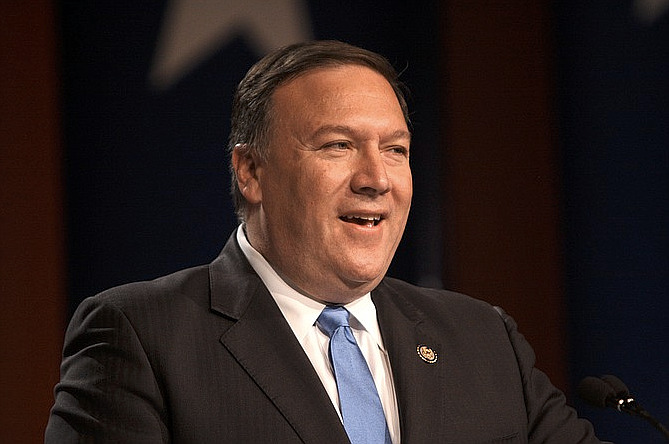Secretary of State Mike Pompeo said in early December that Washington would give Moscow 60 days to return to compliance before it gave formal notice of withdrawal. The 60-day deadline expires Saturday. Photo courtesy Flickr/Gage Skidmore Photo by Flickr/Gage Skidmore
WASHINGTON (AP) — The United States announced Friday that it was pulling out of a landmark nuclear arms control treaty with Russia, accusing Moscow of violating the Cold War-era pact with "impunity" by continuing to develop banned missiles.
President Donald Trump said Russia has been secretly developing "a prohibited missile system that poses a direct threat to our allies and troops abroad." He said the U.S. had adhered to the Intermediate-Range Nuclear Forces treaty since it was signed in 1987, but Russia has not.
"We cannot be the only country in the world unilaterally bound by this treaty, or any other," Trump said in a written statement.
Some analysts worry the demise of the centerpiece of superpower arms control could fuel a new arms race. U.S. officials fear that China, which is not party to the treaty, is gaining a significant military advantage in Asia by deploying large numbers of missiles with ranges beyond the treaty's limit.
Trump said the U.S. will "suspend its obligations" under the treaty on Saturday, meaning it will be freed from its constraints that included the banning of testing and deployment of missiles. At the same time, the U.S. will begin withdrawing from the treaty, which will be effective in six months, he said.
An American withdrawal had been expected for months after years of unresolved dispute over Russian compliance with the pact. It was the first arms control measure to ban an entire class of weapons: ground-launched cruise missiles with a range between 500 kilometers (310 miles) and 5,500 kilometers (3,400 miles).
Secretary of State Mike Pompeo said in early December that Washington would give Moscow 60 days to return to compliance before it gave formal notice of withdrawal. The 60-day deadline expires Saturday.
Technically, a U.S. withdrawal would take effect six months after this week's notification, leaving a small window for saving the treaty. However, in talks this week in Beijing, the U.S. and Russia reported no breakthrough in their dispute, leaving little reason to think either side would change its stance on whether a Russian cruise missile violates the pact.
"We have raised Russia's noncompliance with Russian officials — including at the highest levels of government — more than 30 times," Pompeo told reporters Friday at the State Department. "We have provided Russia an ample window of time to mend its way. Tomorrow that time runs out."
Sergei Ryabkov, a Russian deputy foreign minister, said there was no progress after the Beijing talks Thursday.
"The position of the American side is very tough and like an ultimatum," he said, according to the Russian state news agency Tass.
NATO said that if Moscow failed to destroy all new missile systems that Washington insists violate the treaty, "Russia will bear sole responsibility for the end of the treaty." Russia denies that it has been in violation.
Trump said his administration "will move forward with developing our own military response options."
But senior Trump administration officials said they don't expect any immediate testing or deployment of weapons that are banned under the treaty.
The officials, speaking after Trump's announcement, said the U.S. is not in position to flight test, let alone deploy, INF noncompliant missiles as a counter to Russia any time soon. The officials spoke on condition of anonymity under ground rules set by the White House.
One official said that only non-nuclear missiles are being considered for future development and potential deployment, and that allies will be closely consulted before any decisions are made on countering the Russian missiles that allegedly violate the INF treaty.
Leaving the treaty would allow the Trump administration to counter the Chinese, but it's unclear how it would do that.
"The strategic rationale for leaving the INF seriously involves China," said Behnam Ben Taleblu, a defense expert at the Foundation for Defense of Democracies, a Washington think tank.
He noted the quality and quantity of Chinese ground-based missiles and growing prospects for Chinese and American conflict in the Asia-Pacific.
Taleblu said staying in the pact meant the U.S. was "voluntarily fighting with one hand tied behind its back."
U.S. withdrawal raises the prospect of further deterioration in U.S.-Russian relations, which already are arguably at the lowest point in decades, and debate among U.S. allies in Europe over whether Russia's alleged violations warrant a countermeasure such as deployment of an equivalent American missile in Europe. The U.S. has no nuclear-capable missiles based in Europe; the last of that type and range were withdrawn in line with the INF treaty.
Nuclear weapons experts at the Carnegie Endowment for International Peace say U.S. withdrawal under current circumstances would be counterproductive, even though Russia's violations are a serious problem.
"Leaving the INF treaty will unleash a new missile competition between the United States and Russia," they said in a statement.
Copyright Associated Press. All rights reserved. This material may not be published, broadcast, rewritten, or redistributed.



Comments
Use the comment form below to begin a discussion about this content.